Minute Man National Historic Park
Tuesday, October 24, 2006You are a young soldier, thousands of miles from home serving in an occupying force. Despite the fact that just a few years before your country fought and won a war largely on the behalf of the native population, there is now a bitter divide in the country you are occupying over your presence. The local populace attempts to undermine you and your fellow troops at every opportunity. The situation is extremely tense, and dangerous. In order to attempt to stabilize the situation, your commander has ordered a series of sweeps outside of your protected bases. These raids are intended to provide a show of force, and to seize weapons caches that could be used against you. There is also hope of capturing some of the insurgent leaders behind the uprisings.
Iraq, 2006??
No, Boston in April, 1775.
Rising at 2am, you assemble and load into boats to cross the Charles River. You are so tightly packed in the boats that you have to remain standing. Things are already screwed up – either the higher ups forgot to consult a tide table or just didn’t care, so the boats cannot cross all the way – you and your fellow troopers have to get out far from shore and wade in waste deep mud, holding your weapons and supplies above the muck.
By 4am, you are marching west of Boston. There have been a few other such early morning raids. The first one, in Cambridge, went okay, and a weapons cache was seized. Rather than being embarrassed about it, the locals from Cambridge swarmed into Boston and held a loud, raucous protest with almost 4000 people. Since then subsequent raids to Marblehead and Salem were failures, as somehow the element of surprise was lost. In Salem, the townspeople even raised the drawbridge to prevent the King's troops from entering town. It was a tense situation, but eventually your officers decided to just turn around and back down. It was a humiliating loss of face for the most powerful military in the world. Morale plummeted.
The word passes down the line that it will be a 17 mile march to the village of Concord. It’s a long and uncomfortable walk, particularly as it’s a cool spring morning, and you are soaking wet from the mud.
Early morning, after a miserable nighttime march, your column comes into the village of Lexington. Up ahead on the village green is a small collection of Colonial Militiamen. You seem to have them outnumbered by 10 to 1, and no one has any good idea why they are there. Other than that one unfortunate incident in Boston a year ago, there hasn’t been any shooting. Your officer deploys you into lines, and then calls out to the colonials to disburse. They appear to be doing so when someone fires.
Wet, tired, and having been under near constant harassment from the locals for months, someone breaks orders and fires back. More join in, and when the smoke clears, several of the locals are lying dead or wounded, and your officers are screaming in your face, furious at the lack of control exhibited. No firing without orders! It’s going to be that Boston mess all over again, with murder trials and everything.
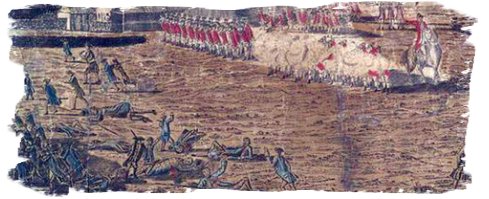
It’s obvious that the word is out, and once again the raid will not be a surprise. The remaining militia takes off, and you start down the road toward Concord. Once arriving there, the column splits where one column goes to seize the suspected weapons cache, the other is left to guard the bridge north of town.
As suspected, everything is all screwed up. A few weapons are found, but not the cannon or powder caches hoped for. There are no signs of Mr. Hancock or Sam Adams, the rebel leaders. Alarmingly, there are a lot of colonial militiamen about, the number growing by the minute. More than a lot - a huge number of militia are on the scene.
When smoke is spotted in Concord, a large group of militia approaches from the west side of the bridge, and there is a tense standoff. Your column of troops is outnumbered. Badly outnumbered. Not for the first time, you wonder what the heck you are doing in this god forsaken place, facing a bunch of people who don’t want you there. One of your fellow redcoats, without orders, fires into the colonials.

And as they say, the rest is history...
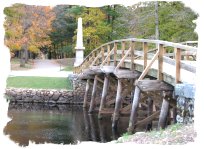 The British regulars firing on the Colonials at the Old North Bridge prompted the Colonial commander, Major Buttrick, to give the order to return fire. Thus the first official ‘order’ to fire on the King’s troops was given, starting the rebellion. Ralph Waldo Emerson later immortalized this battle, next to his grandfather’s house, with his famous words about ‘the shot heard round the world’.
The British regulars firing on the Colonials at the Old North Bridge prompted the Colonial commander, Major Buttrick, to give the order to return fire. Thus the first official ‘order’ to fire on the King’s troops was given, starting the rebellion. Ralph Waldo Emerson later immortalized this battle, next to his grandfather’s house, with his famous words about ‘the shot heard round the world’.The skirmish at Old North Bridge was relatively small, but the British retreat back to Boston was anything but normal. Using a communications network consisting of church bells and horse riders, there were in the neighborhood of 20,000 Colonial Militiamen that joined in the battle or converged on Boston before the day was out. The British had about 700 troops in the field, and only the appearance of a relief column marching out from Boston in the afternoon prevented the total destruction of the initial British force.
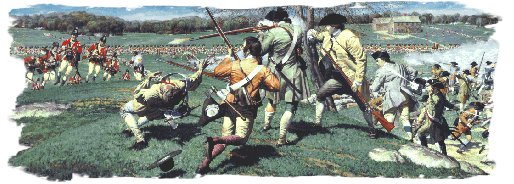
Although popular history holds that the colonials hid behind tree’s and rocks, firing at the hapless line of Redcoats marching back to Boston, it wasn’t quite that simple. The colonials did continually move ahead of the British march, finding ambush positions along the road. The British Regulars, in turn, sent out flanking patrols to the sides of the roads to chase the militia away. The British Army essentially was forced to do a fighting retreat, with a moving battle that lasted until they finally came under the protection of the guns from the HMS Somerset, anchored in the Charles River. At the end of the day, the British Regulars had suffered 273 casualties, after marching nearly 40 miles, and in constant battle for 8 hours. It was a terrible and horrifying day for the King’s Troops.
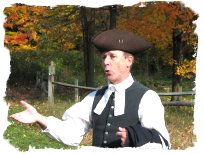
Our visit to Minute Man National Historic Park highlighted why homeschooling works so well for us. We linked up with a school field trip at Hartwell Tavern, located between Lexington and Concord, and about 100 yards away from Bloody Angle, where the Colonials set an particularly effective ambush for the retreating British Redcoats. There were two Rangers in period costume, one acting as a minute man, the other as member of the clergy. They conducted a program on musket firing, along with a discussion of the religious beliefs and practices of the area in 1775. It was a good program, and I’m sure the school kids learned a good deal. They were well chaperoned, well behaved, and asked good questions.
Then they all got back on the bus, and left.
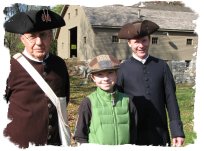 We were left at the restored tavern by ourselves, and for the next hour Vance was treated to a one on one program with the two Park Rangers. The Rangers posed for pictures, they lectured, and they answered Vance’s and our questions. One of the Rangers gave Vance a piece of flint that had been prepared for the flintlock rifle. They talked about meals, getting the mail, propaganda created by the “Son’s of Liberty”, and what it might have been like for a boy Vance’s age on that fateful day. It was a wonderful lesson. Our compliments to the rangers and their flair for history.
We were left at the restored tavern by ourselves, and for the next hour Vance was treated to a one on one program with the two Park Rangers. The Rangers posed for pictures, they lectured, and they answered Vance’s and our questions. One of the Rangers gave Vance a piece of flint that had been prepared for the flintlock rifle. They talked about meals, getting the mail, propaganda created by the “Son’s of Liberty”, and what it might have been like for a boy Vance’s age on that fateful day. It was a wonderful lesson. Our compliments to the rangers and their flair for history.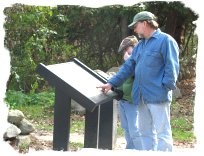 Armed with a bit more knowledge on how the battle went that day, plus understanding the limited range of the muskets, Vance and I did some role playing. I’d send Vance down the road a little bit, instructing him to find a good place to hide – behind a tree, or one of the stone fences that line the road and pastures. I would then come marching down the road, pretending to be the Redcoat column. Vance would fire, I’d fall dead or wounded, and he’d run for safety. Occasionally, I’d jump the rock walls and chase him, pretending to be one of the British Grenadiers who spent all day trying to flank the Colonial Militiamen.
Armed with a bit more knowledge on how the battle went that day, plus understanding the limited range of the muskets, Vance and I did some role playing. I’d send Vance down the road a little bit, instructing him to find a good place to hide – behind a tree, or one of the stone fences that line the road and pastures. I would then come marching down the road, pretending to be the Redcoat column. Vance would fire, I’d fall dead or wounded, and he’d run for safety. Occasionally, I’d jump the rock walls and chase him, pretending to be one of the British Grenadiers who spent all day trying to flank the Colonial Militiamen.As a consequence of this and similar visits to other National Historic Sites, Vance is becoming quite the little historian. Not having to hop back on the school bus has its advantages. Importantly, he really appears to be enjoying it, experiencing history up close, rather than simply reading about it in a sanitized textbook.
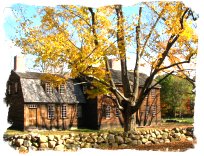 The park itself is a long narrow sliver of land located between Lexington and Concord, anchored by a pair of Visitors Centers at both ends. Much of the park land had been developed, and the Park Service razed multiple sixties style ranch homes to recreate the unpaved, stacked rock wall lined road that the British Regulars marched back and forth on April 19, 1775. Named Battle Road today, there are also several historic structures (such as Hartwell’s Tavern) along the route.
The park itself is a long narrow sliver of land located between Lexington and Concord, anchored by a pair of Visitors Centers at both ends. Much of the park land had been developed, and the Park Service razed multiple sixties style ranch homes to recreate the unpaved, stacked rock wall lined road that the British Regulars marched back and forth on April 19, 1775. Named Battle Road today, there are also several historic structures (such as Hartwell’s Tavern) along the route.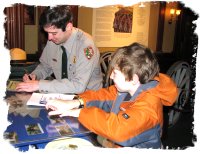 Of the Jr. Ranger programs that Vance has completed, this was one of the most thorough. It was tough to complete everything in a single day. He finished his last requirements just minutes before the Old North Bridge Visitors Center closed up for the day!
Of the Jr. Ranger programs that Vance has completed, this was one of the most thorough. It was tough to complete everything in a single day. He finished his last requirements just minutes before the Old North Bridge Visitors Center closed up for the day!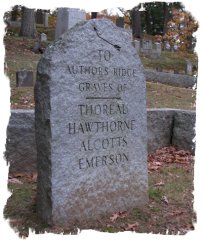 Rounding out our day at Concord, we paid a short visit to Sleepy Hollow Cemetery just before dusk. Grouped closely together on the wooded ‘Authors Ridge’ were the graves of Ralph Waldo Emerson, Henry David Thoreau, Louisa May Alcott, and Nathanial Hawthorne. It’s hard to image another location where so many literary giants are buried this close together.
Rounding out our day at Concord, we paid a short visit to Sleepy Hollow Cemetery just before dusk. Grouped closely together on the wooded ‘Authors Ridge’ were the graves of Ralph Waldo Emerson, Henry David Thoreau, Louisa May Alcott, and Nathanial Hawthorne. It’s hard to image another location where so many literary giants are buried this close together.
Later that day a small group of Colonials showed up at
THE VERY FIRST BATTLES OF THE REVOLUTION!
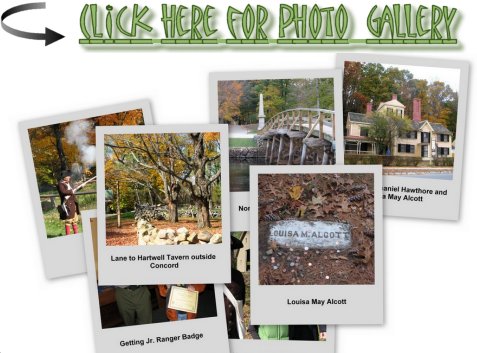








<< Home